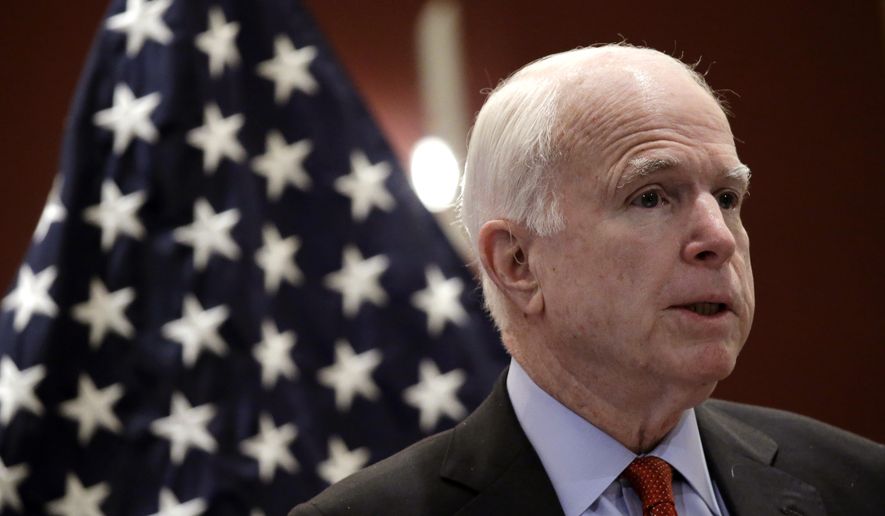COLORADO SPRINGS, Colo. (AP) - Colorado lawmakers are working to block an effort by Sen. John McCain that could put U.S. Northern Command in Colorado Springs on the chopping block.
McCain, R-Arizona, has floated the idea of merging Northern Command, which oversees defense of the continent, with Southern Command, which focuses on Central and South America, The Gazette of Colorado Springs reported (https://bit.ly/1TQ9AUK).
It’s an idea that has united Colorado politicians across partisan divides, with U.S. Sen. Michael Bennet, D-Denver, and U.S. Rep. Doug Lamborn, R-Colorado Springs, in rare agreement on the issue. Lamborn, whose district includes five military bases, has said he’ll kill McCain’s idea if it comes to the House. Bennet is working to squash it in the Senate first.
“It doesn’t make sense, and I haven’t seen evidence that makes it make sense,” Bennet said.
In a series of hearings, McCain, who heads the Senate Armed Services Committee, has called for redrawing the boundaries of the nation’s regional combat commands in a bid to cut Pentagon overhead while making the headquarters more effective in wartime.
“We need a defense organization that can meet our present and future challenges,” McCain said in a November speech.
At the heart of the debate is the 30-year-old Goldwater-Nichols Act, which built the combatant commands in a bid to clean up problems identified after Operation Eagle Claw, the military’s botched 1980 mission to rescue hostages in Iran.
Combatant commands such as Northern Command were set up as entities that exist outside the armed services. The four-starred leaders of those commands, like Air Force Gen. Lori Robinson who recently took the reins of Northern Command, report to Defense Secretary Ashton Carter rather than uniformed leaders.
That structure was meant to stamp out rivalries between the services that could cause chaos in combat.
But with the military facing a budget crunch and new ways of warfare emerging, some have argued that the combatant commands need a shake-up.
“Cyber operations have reached such a high importance and complexity that arguably they should no longer be subsumed within Strategic Command,” wrote Michael O’Hanlon of the Brookings Institute think tank. “This question deserves scrutiny, as does the question of whether Northern Command is really needed, or whether it might best be merged with Strategic Command.”
Northern Command’s old boss, Adm. Bill Gortney, said he can’t figure out why there’s a push to squeeze that command out of business.
“I’m a fact-based person,” Gortney said. “What is the problem you want to fix?”
Northern Command was created after the 9/11 attacks to monitor and deter threats to North America. It has the additional role of providing Defense Department help to local authorities when disaster strikes. In addition to terror concerns, Northern Command includes America’s contribution to the North American Aerospace Defense Command, a 58-year-old binational organization built during the Cold War.
Carter in an April speech said the Department of Defense needs to cut the fat out of top-heavy combatant commands, but said merging commands isn’t the right way to find efficiencies.
“We can meet these targets without combining Northern Command and Southern Command, or combining European Command and Africa Command - actions that would run contrary to why we made them separate, because of their distinct areas of emphasis and increasing demands on our forces in them,” Carter said.
Bennet said if McCain wants to understand the necessity of an independent Northern Command, he needs to visit Colorado Springs. The senator learned of its importance during a recent visit to the Cheyenne Mountain Operations Center, the underground command post that includes Northern Command operations.
“It just became clear that these missions are so critical and that the infrastructure we need to carry out these missions is here,” Bennet said.
Gortney said if McCain keeps pushing, Northern Command can easily justify its existence.
“Sen. McCain asks tough questions,” Gortney said. “I like tough questions.”




Please read our comment policy before commenting.